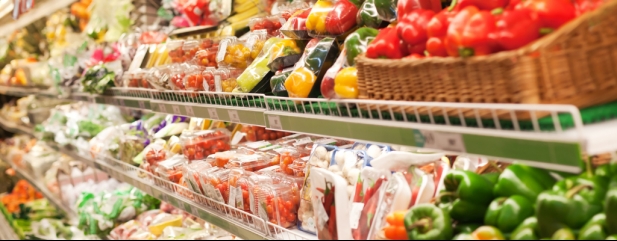Archived article
Please note that tax, investment, pension and ISA rules can change and the information and any views contained in this article may now be inaccurate.
Supermarket sales slide extends to over a year as shoppers trade down

The latest supermarket ‘till roll’ from Kantar for the 12 weeks to mid-June makes for more unhappy reading for the industry and consumers.
Total sales by value in the period, which included the Platinum Jubilee celebrations, shrank by 1.9% due to a more than 10% fall in the number of items purchased.
Offsetting the fall in volumes was a further spike in inflation which reached a record 8.3% in the last four weeks of the period.
Sales growth has been negative for over a year now, partly due to the surge in supermarket food spending during the pandemic when we were all eating at home but also due to the rising cost of living.
Based on Kantar’s own data, the average annual grocery bill is on course to rise by £380 this year compared with last year.
‘This is over £100 more than the number we reported in April this year, showing just how sharp price increases have been recent and the impact inflation is having on the sector’, said Fraser McKevitt, head of the firm’s retail and consumer insight.
The only two retailers to show an increase in sales, predictably, were the German discounters Aldi and Lidl, with rises of 7.9% and 9.5% respectively.
Both retailers predominantly sell own-label goods, which is contributing to the overall rise of private-label products at the expense of branded products.
Kantar also flagged the increase in popularity of supermarket own-label value ranges, with sales surging by 12% over the period.
Interestingly, more shoppers seem to be opting to visit stores rather than shop online, possibly to avoid expensive delivery charges.
On 17 June market leader Tesco (TSCO) disappointed the market with a first quarter trading update which revealed UK like-for-like sales were down 1.5% in the three months to the end of May.
On 5 July, smaller rival Sainsbury’s (SBRY) is due to update investors on its first quarter, during which its market share shrank to 15% from 15.3% a year ago and its sales fell roughly 10% according to Kantar.
Year-to-date, Tesco shares are down 13% and Sainsbury’s shares are down 24% while the FTSE 100 is down just 4.5%.
Important information:
These articles are provided by Shares magazine which is published by AJ Bell Media, a part of AJ Bell. Shares is not written by AJ Bell.
Shares is provided for your general information and use and is not a personal recommendation to invest. It is not intended to be relied upon by you in making or not making any investment decisions. The investments referred to in these articles will not be suitable for all investors. If in doubt please seek appropriate independent financial advice.
Investors acting on the information in these articles do so at their own risk and AJ Bell Media and its staff do not accept liability for losses suffered by investors as a result of their investment decisions.
Issue contents
Education
Feature
Great Ideas
Investment Trusts
News
- Supermarket sales slide extends to over a year as shoppers trade down
- Trustpilot pulls forward breakeven target at its big investor day
- Henderson manager hits the sell button on Shell
- Why Primark's plan to trial new click and collect service could be smart
- How rising interest rates are increasing the risk of recession

 magazine
magazine








